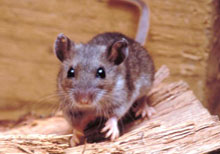Frequently Asked Questions
 What are Hantavirus and HPS?
What are Hantavirus and HPS?
According to the California State Department of Public Health (CDPH), Hantavirus Pulmonary Syndrome, or HPS, (sometimes referred to as Hantavirus Cardiopulmonary Syndrome, or HCPS) is an uncommon, potentially severe disease of the lungs which was first recognized in 1993 in the "Four Corners" area (where Utah, Colorado, Arizona, and New Mexico meet) of the southwestern United States. The disease is caused by a virus called Sin Nombre that is carried by wild mice and shed in their feces, urine, and saliva. HPS is a rare, but often fatal, disease.
Where is Hantavirus found?
Hantavirus is found in all regions of the United States. Deer mice are the primary carriers, along with cotton rats and rice rats in the southeastern states and the white-footed mouse in the Northeast. Potential sites where people may be exposed include areas that offer a habitat for rodents: rural areas, forests, fields, farms, barns, outbuildings, and sheds.
How do you get HPS?
The virus is shed in the droppings, urine, and saliva of rodents. Humans can become infected when they inhale the virus which can get into the air when rodent droppings, urine, or nesting materials are agitated. Humans cannot transmit the virus to one another (e.g. close contact with or providing healthcare to someone who is infected).
According to the CDC, there are several other ways rodents may spread Hantavirus to people:
- If a rodent with the virus bites someone, the virus may be spread to that person, but this type of transmission is rare.
- Researchers believe that people may be able to get the virus if they touch something that has been contaminated with rodent urine, droppings, or saliva, and then touch their nose or mouth.
- Researchers also suspect people can become sick if they eat food contaminated by urine, droppings, or saliva from an infected rodent.
The types of Hantavirus that cause HPS in the United States cannot be transmitted from one person to another. For example, you cannot get the virus from touching or kissing a person who has HPS or from a health care worker who has treated someone with the disease. You also cannot get the virus from a blood transfusion in which the blood came from a person who became ill with HPS and survived.
How can I protect myself from getting HPS?
See the California Department of Public Health brochure on Hantavirus.
What is Alameda County doing to control the spread of Hantavirus?
According to Alameda County Vector Control Services District (ACVCSD):
- Deer mice, the reservoir animals of Sin Nombre virus that causes human Hantavirus Pulmonary Syndrome (HPS), are abundant and widely distributed in Alameda County, especially in rural communities and in housing developments that are built adjacent to wild, open areas. ACVCSD staff has conducted hantavirus surveillances in Anthony Chabot, Del Valle, Redwood, Sunol, and Tilden Regional Parks, as well as in different locations in Oakland, Dublin, Fremont, Pleasanton, and Livermore. Positive antibodies of Sin Nombre virus have been identified from deer mice. Any person exposed to rodent urine, droppings or nesting material when cleaning an abandoned outhouse, dilapidated barn and horse stable, cabin, or storage shed should take precautions and follow the Rodent Clean Up recommendations.

